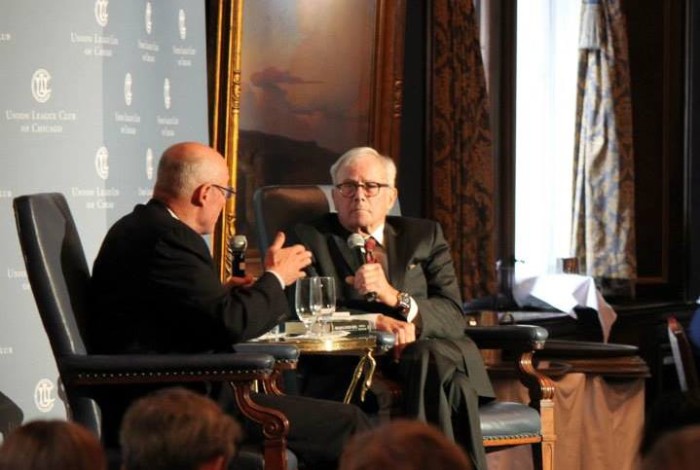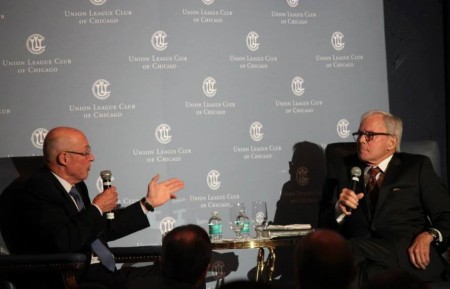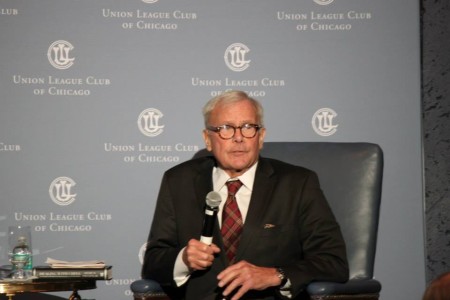
Tom Brokaw claims to owe Hank Paulson an eternal favor. Nearly a decade ago, he urged Paulson to take the Treasury secretary job during a shared bird watching trip in Belize, he recounted today at an event in Chicago. The rest, of course, is history, as Paulson took the job and subsequently steered the United States economy through one of its most turbulent periods. The two were discussing Paulson’s new book, Dealing With China, onstage at the Union League Club of Chicago.
Brokaw, the longtime NBC anchor, went on to recall his first trip to China in 1974, where he went for a run through the streets of Beijing only to discover the city’s coal-tainted air had deposited a significant amount of soot into his ears and nose. Shocked by his audacity, the American delegation quickly warned him against such outdoor activity.
 Paulson, who has made more than 100 trips to China over his years in the business, government, and non-profit sectors, sympathized with Brokaw’s experience but was optimistic that change may be in the air. “Previously, when I would meet with officials on the provincial and municipal levels, it would be all about their GDP growth figures,” Paulson said. “Now they all cite the air quality statistics in their regions.”
Paulson, who has made more than 100 trips to China over his years in the business, government, and non-profit sectors, sympathized with Brokaw’s experience but was optimistic that change may be in the air. “Previously, when I would meet with officials on the provincial and municipal levels, it would be all about their GDP growth figures,” Paulson said. “Now they all cite the air quality statistics in their regions.”
Air quality worsened by breakneck economic growth is only one of many problems facing China’s leaders, Paulson told the crowd. But the leaders, starting with Xi Jinping, are “striving to remake China on an unprecedented scale,” said Paulson. It won’t be easy, but Xi’s ability to consolidate power and place reform-minded leaders in key roles will go a long way toward addressing China’s challenges.
 According to Paulson, chief among these challenges will be reforming an “economic growth model that has run out of steam.” China’s leaders know where they need to go, but they aren’t necessarily relying on Western models to get there. To illustrate his point, Paulson told a story from his time at Treasury, when Chinese anti-corruption head Wang Qishan came to visit Washington. Paulson remembered Wang telling a group of congressmen, “In the US, you wake up in your air-conditioned room, take a steaming hot shower, then get in your air-conditioned car and drive to your air-conditioned office. There is no way we could ever do that in China.” “If 1.3 billion Chinese tried to live like Americans,” Paulson added, “there wouldn’t be enough resources in the world!”
According to Paulson, chief among these challenges will be reforming an “economic growth model that has run out of steam.” China’s leaders know where they need to go, but they aren’t necessarily relying on Western models to get there. To illustrate his point, Paulson told a story from his time at Treasury, when Chinese anti-corruption head Wang Qishan came to visit Washington. Paulson remembered Wang telling a group of congressmen, “In the US, you wake up in your air-conditioned room, take a steaming hot shower, then get in your air-conditioned car and drive to your air-conditioned office. There is no way we could ever do that in China.” “If 1.3 billion Chinese tried to live like Americans,” Paulson added, “there wouldn’t be enough resources in the world!”
Whether China follows the United States or not, Paulson emphasized the importance of a strong US-China bilateral relationship. The relationship will get tougher and more complex in the future, warned Paulson, but the world’s largest problems will be easier to address if China and the United States are working together. Through cooperation on issues such as climate change, China has already shown its commitment to making a difference and working with others. “China will not eat our lunch,” Paulson stressed. “You can make as big a mistake exaggerating China’s strength as you can underestimating its potential.”



